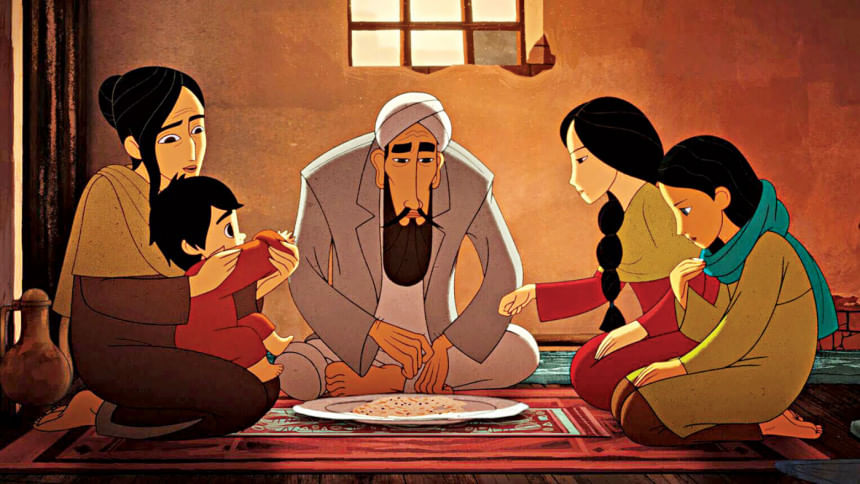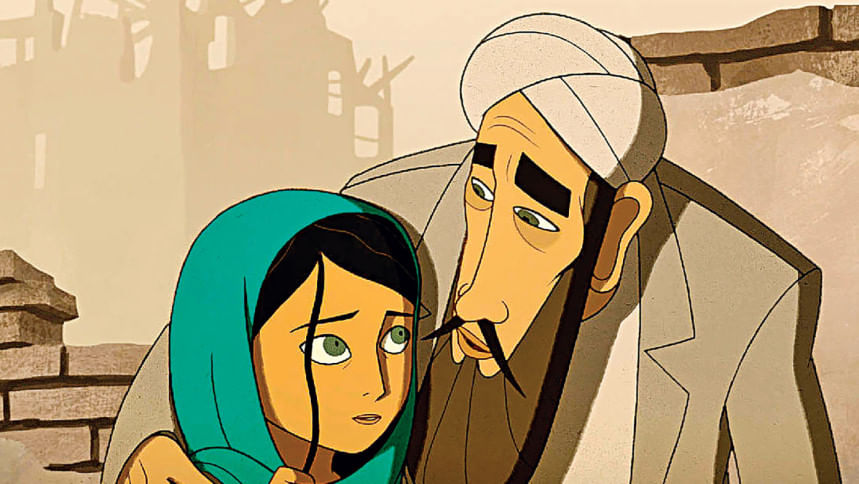Keeping hope alive through storytelling: Why ‘The Breadwinner’ is a timely watch

In the past few weeks, we saw our feeds being flooded with posts and messages from Afghanistan as the Taliban once again took over the country. They were messages filled with feelings of looming fear, uncertainty and helplessness, so much so that these feelings hovered around us with a certain sense of unease as well, even though we are miles away from the occurring.
War is always the hardest on women and children. Setting all the geopolitical discussions aside, it is not brand new information that the Taliban rule proved to be the worst for the women of Afghanistan in particular. "The Breadwinner" (2017) is a timely watch to comprehend the horrors that Afghan women are now anticipating with each passing moment. Based on a novel by Deborah Ellis, this one and a half-hour long animated feature film from Irish animation studio Cartoon Saloon is written by Anita Doron in collaboration with Aman Mojadidi, and directed by Nora Twomey.
The story circles around a young Afghan girl named Parvana, who is compelled to take the identity of a boy to sustain her family consisting of her mother, an elder sister and a little brother after her father is wrongfully arrested by the Taliban. In the process, she rekindles her friendship with Shauzia, an old school friend who too, takes up the identity of a boy to sustain herself and her family.
Parvana not only has to play the role of the sole breadwinner of the family after her father's arrest, but also takes up the role to keep the feeble spark of hope burning in the household with her stories, just like her father used to. Her father, Nurullah Alizai, a school teacher who lost a leg in the Soviet-Afghan War, is seen to be teaching his daughter history with his spontaneous way of storytelling, before getting arrested by the Taliban. He describes the history and heritage of the Afghans with his vibrant stories, visualised even more beautifully with the animation. This is the role that Parvana has to play for her little brother Zaki, as well as her mother and her sister.
One particular frame that stayed with me long after I finished watching the film is when Nurullah describes how the country landed itself where it is now, with the Taliban taking the autonomy away from Afghan women in the name of the Sharia law and imposing the veil on those who would otherwise be unwilling to wear one.

In the particular frame that I'm talking about, Nurullah's narrations are accompanied by a visual of a woman behind closed doors and a veil, where the veil is made to look like the bars of a jail gate. This single frame, with its visual appeal, was able to render the message clearer than ever. Women were not being protected under the Taliban rule, they were being caged.
Apart from the visuals, the writing of the film stands out as well. The most well-written character in the film, according to me, is that of Razaq – an individual with strongholds among the Taliban who forms a peculiar friendship with Parvana, dressed as Aatish, in the face of grief of losing a loved one. This grief that binds the two together also brings out the more humane side of Razaq, who eventually helps Parvana to rescue her father, risking his own life.
Even after knowing Parvana's whole truth, Razak doesn't punish her with the authority that he holds, rather he deals with it through empathy. That is one brilliant and beautiful example of character development in the face of adversity.
Storytelling becomes a coping mechanism for Parvana, which is evident in how, when Parvana and Shauzia are faced with a crisis, Parvana once again takes solace in storytelling in her process of trying to comfort Shauzia, or perhaps herself.
Shauzia, however, takes a different approach with it altogether. While Parvana's story, as mythical as it is, contains the grim realities of the life they were living, Shauzia, with the spirit of a dreamer, tends to turn every element of the story into a light and heartwarming one.
Parvana even conquers the most gut-wrenching challenge of rescuing her father amidst a looming threat of war and uncertainty with the power of a story, and in the process comes to terms with a long-suppressed trauma of losing her elder brother Sulayman to the war.
With all the brilliant portrayals of suffering, grief and trauma, I think this is the very reason that the film stands out. It is a timely watch not because of its contextual relevance, but because it generates hope, and talks about real courage, all of it through the power of a single story taking different turns. It reminds us how powerful storytelling can be, and no matter how difficult it gets to carry on, one can always come through by keeping hope and courage alive.
"The Breadwinner" is available to stream on Netflix.
The author is a sub-editor at Toggle, The Daily Star.

 For all latest news, follow The Daily Star's Google News channel.
For all latest news, follow The Daily Star's Google News channel. 



Comments